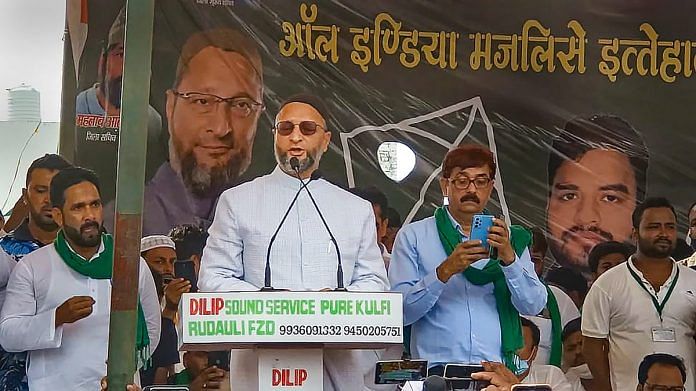
Hyderabad: All India Majlis-e-Ittehadul-Muslimeen (AIMIM) chief Asaduddin Owaisi, who has been aggressively trying to expand his party beyond home turf Hyderabad, has failed to make a mark in the Hindi heartland. His party, which contested nearly thrice the number of seats in Uttar Pradesh than it did in 2017, has again failed to open its account in the state.
In 2017, AIMIM contested 38 out of the state’s 403 seats and polled around 2 lakh votes — which is just about 0.2 per cent of the voteshare. This time, it fielded 97 seats and did not win even one. The party’s voteshare, however, increased to 0.46 per cent, considering the increase in the number of seats contested too.
For the UP polls, the party was in an alliance with Babu Singh Kushwaha’s Jan Adhikar Party, and the Bharat Mukti Morcha. The AIMIM has roughly won 3.4 lakh votes in the UP assembly elections, according to EC data.
The AIMIM’s lacklustre performance indicates that Owaisi failed to convince UP’s Muslims that he is a strong alternative to the BJP.
“Muslims are voting very carefully and their sole focus is to pick someone who can counter the BJP. Owaisi has failed to emerge as that figure,” Ajay Gudavarthy, political analyst and assistant professor at the Centre for Political Studies in Jawaharlal Nehru University (JNU), said.
According to Gudavarthy, Muslims did not believe that the AIMIM offered an “alternative agenda” to regional parties other than “counter-polarisation”. Many Muslims, he said, are also “suspicious” about the party’s alleged tie-up with the BJP to divert Muslim votes from the Samajwadi Party, an allegation the AIMIM has denied.
“The admiration for Owaisi’s speeches did not translate into votes. And his traction is mostly among certain pockets of educated middle class or youth. Traditional voters, who previously voted for the SP or the Congress, could be continuing with them. They’re not drawn to Owaisi as a strong Muslim face,” he added.
Owaisi’s pitch in UP has been quite straightforward — better representation of Muslims in political and leadership roles, and fighting to end the “discrimination and repression” that the community is being subjected to.
In a quick interaction with the press after the results, Owaisi said the Uttar Pradesh election outcome is an “80:20” situation and the trend is going to continue for a “long time” in the country. He also said minorities in UP have been used as a votebank.
“Uttar Pradesh people have once again chosen to give the BJP a chance and whatever is the decision of the people, we respect it. We did work very hard but the result is not as we expected. But we will continue to work harder.”
Owaisi said the AIMIM will also contest elections in Rajasthan and Gujarat, and the Lok Sabha polls in Uttar Pradesh, adding that those who termed him “BJP’s B-team must introspect how the party won in states where the AIMIM did not contest”.
Also Read: Opposition is silent on gunshots at Owaisi. They’re wrong to think it will trigger Hindus
‘No major dent in SP’s votes’
A large section of the 19 per cent Muslim population in Uttar Pradesh rallies behind Akhilesh Yadav’s Samajwadi Party, whose voteshare the AIMIM was expected to eat into.
Political analysts believe the impact has been marginal at best and Owaisi hasn’t been able to live up to his promise as a ‘vote-cutter’ for the SP.
“Muslims have been very silent. In 73 assembly constituencies, they constitute over 30 per cent of the electorate. They just want to vote for any party that is capable of defeating the BJP. MIM factor is next to nothing,” Ravichand, from poll survey firm Peoples Pulse, said.
According to him, it was quite likely that “80 per cent of Muslims” voted for the SP and that Owaisi was seen more as a “poster boy like Bhim Army’s Chandrashekhar Azad” than as a serious political alternative.
“Only those who have access to phones and see Owaisi’s speeches on social media might be drawn to him. Otherwise, nothing,” Ravichand said.
The muted reaction to an attack on Owaisi in Hapur, UP, in the run-up to polls was a hint that the leader did not have much cache in the state, Gudavarthy said. “Even that did not resonate strongly. Reactions from the community should have been louder if they actually considered him as a strong leader.”
From Hyderabad lanes to Maharashtra, Bihar
From its modest origins in the bylanes of Hyderabad, the AIMIM has come a fair distance, especially in the past couple of years, when it has tried to build a presence beyond the region, where it has seven assembly seats and one Lok Sabha seat in Hyderabad.
There have been a few successes.
In the 2020 Bihar elections, the AIMIM won five of the 20 seats it contested — a huge boost compared to the dismal performance of 2015 where it even ended up losing deposits.
In Maharashtra, in 2019, the party won the Aurangabad Lok Sabha seat — making it the second parliament seat for the AIMIM. The party also retained their two assembly seats in state.
However, forays into other states have not been so successful. The party failed to establish its footprint in West Bengal, Tamil Nadu, and Jharkhand and its UP performance has also left a lot to be desired.
The next time it fights elections, the party might do well to consider a stronger alliance, Gudavarthy said. “An alliance with secular parties might make Owaisi’s prospects better,” he said.
Notably, the AIMIM contested in Maharashtra and Bihar in alliances with other parties, unlike West Bengal.
This report has been updated with Owaisi’s response on the election results
(Edited by Asavari Singh)
Also Read: Asaduddin Owaisi’s rise is just the opportunity Hindutva politics is waiting for

COMMENTS